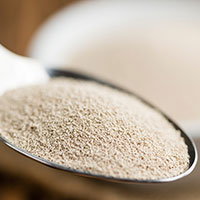| Vitamin name |
Vitamin B6 |
| What’s it used for? | Energy production, key for functioning of over 60 enzymes, immune support |
| Best food sources | Liver, wholegrains, red meat, oily fish, bananas and green leafy vegetables |
| How much do I need? | NRV is 1.4 mg per day* |
| Need to know | Vitamin B6 is often taken in quite large daily dosages to good effect |
*A Nutrient Reference Value or NRV is the recommended level set by the UK Department of Health for daily nutrient intake
Vitamin B6
Vitamin B6 is otherwise known as pyridoxine. In fact, pyridoxine is not just one vitamin but a group of water-soluble compounds, which includes pyridoxine, pyridoxal and pyridoxamine. They are all converted to the most active form, being pyridoxine, in the body.
Why do I need it?
A key member of the water-soluble family of B vitamins, Vitamin B6 is probably best known for its role in managing symptoms of Premenstrual Syndrome (PMS). This is partly due to its ability to influence water retention by maintaining the sodium/potassium balance.
It is also influenced by hormones; when oestrogen levels rise during pregnancy or when taking the contraceptive pill, the requirement for vitamin B6 also increases. It is therefore key in maintaining proper hormone balance throughout the body.
Vitamin B6 plays an important role in energy production because it breaks downs the proteins and fatty acids from foods to create energy. In addition, it’s essential in many different body systems through its role in the correct functioning of numerous enzymes. Vitamin B6 is also essential for supporting immune function.
Best food sources
Plant sources tend to provide the most vitamin B6.
Foods high in vitamin B6

Brewer’s Yeast – 2.5 mg per 100g

Sunflower seeds – 1.25 mg per 100g

Bananas – 0.51 mg per 100g

Avocadoes – 0.42 mg per 100g

Kale – 0.30 mg per 100g
Are you getting enough?
Vitamin B6 can be very useful in cases of stress, nervous disorders or headaches. It is often used in something called the ‘pyridoxal-5-phosphate’ form as this is able to more directly influence metabolic cycles, which means it can be really helpful in cases of fatigue or mental illness.
Vitamin B6 is often taken in quite large doses with great effect; 50-200 mg daily, particularly in cases of PMS. Occasionally muscle tingling may be experienced but this is generally only with much larger doses. This is reversed when the dosage is reduced or by taking magnesium at the same time.
Symptoms of mild depression, anaemia, split lips and cracks in the corners of the mouth, red inflamed tongue and poor sleep can sometimes be associated with deficiency. However, extreme deficiency is rare.
Did you know?
Vitamin B6 is used to great effect with vitamins B12 and folic acid in reducing homocysteine, high levels of which are a marker for heart diseaseIt is suitable to take at the recommended dosages during pregnancy and breastfeeding. In fact the body has a high requirement for vitamin B6 during pregnancy to maintain hormonal health of the mother – consult your healthcare professional for further advice
Vitamin B6 can be useful in cases of morning sickness
For all the latest research on vitamin B6 click here
For more information visit www.feelaliveuk.com
You can also follow Alive! on Twitter for general health and wellbeing tips: @feelaliveuk







